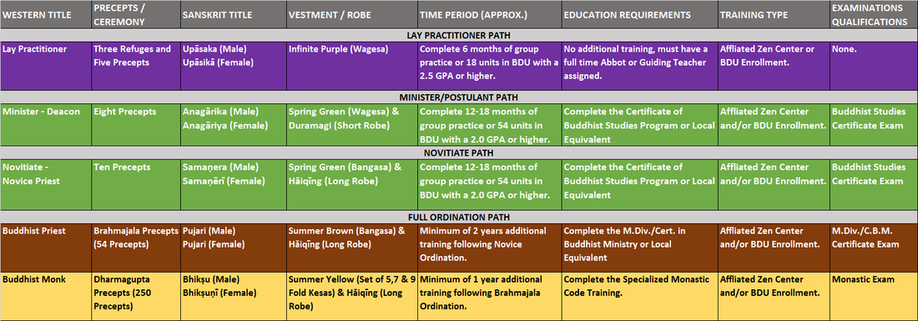The Buddhist Path

The Path of the Heart
Some individuals feel a calling to spiritual practice, to live a simple and meditative life, and perhaps attain what Buddha called, "one's original nature." Along these lines Buddhism has a history of followers that began after the first sermon that Śakyamuni gave following his transformation to a spiritual guide. Quite quickly ethical guidelines as well as procedures for living in a close knit community began to follow. Most of these guidelines and procedures still exist today in a document known as the Pratimokṣa which loosely translated means “moving towards liberation”. For those who seek the Buddhist life, FMZO offers traditional paths of study and ordination that have been recast in the light of our postmodern 21st Century lives. There are two major initial steps that seekers may wish to consider and these are the path of the layperson and the path of the ordained.
| Rt. Click and select save as ordination_chart.png | |
| File Size: | 101 kb |
| File Type: | png |
FMZO and BDU have been established to serve both local Sanghas as well as the "geographically challenged." Not everyone lives near a Zen Center and surely far fewer live near a Buddhist Learning Institution. We currently have thirteen Centers in the US and are in the process of locating a "brick and mortar" location for the University. Additionally, we offer virtual distance support to our various groups and students. This support includes solo retreats as an adjunct to our various physical retreats throughout the year.
The Teachers at FMZO offer in-person Precepts during formal Zen ceremonies that usually coincide with a retreat or a special Buddhist gathering. Additionally, for those who are unable to travel, we offer precepts over the internet via online video conferencing. The 5, the 8, the 10 the 58 precepts and the monastic precepts may be offered as required at each ceremony.
A prospective member of the community seeks out a teacher, either at their local group or online for those who are geographically challenged. This seeking out a teacher is an important first step in the process. Not everyone has the fortitude or commitment to become an ordained priest or monk, so there is always the path of the Deaconate. The process of seeking a teacher is spelled out for those interested in the process and is available upon request. Once an aspirant is accepted, there is a ceremony of the taking of the novice precepts, or training rules. These consist of refining the ethical standards of the individual.
Students of the Five Mountain Zen Order may fall under a number of educational programs. These consist of basic, local, standard, special or re-education; not all are required. All ordained members must complete the standard education program or equivalent, after which they receive their respective precepts depending on the path they have chosen.
In addition to the basic and standard educational program, the order has a number of special programs, which include deeper philosophy, analysis of the precepts as well as programs to foster such monastic resources as chaplains, educators, and lecturers. There are also programs which foster our ordained clergy to develop in a variety of fields in cultural as well as artistic subjects.
The student seeking precepts should be an active supporting member of either their Zen Community or the Seminary and in good standing as an active participant engaged with their respective Guiding Teacher. Precepts are only offered by an Archbishop, or Bishop as they are formal representatives of their respective Dharma lineages. Priests and Monks are permitted to give precepts to students as proctors for their respective teachers.
It is a traditional Buddhist custom to show gratitude to the teacher leading the Precepts ceremony (who may or may not be your guiding teacher) with a small monetary gift. At the time of the ceremony, you may leave a sealed envelope containing the donation on the altar, with the name of the Precepts teacher on it (and your own if you would like to).
A personal note or card is always welcome along with the gift. If you wish to make a gift by check, it should be made out to the Precepts teacher personally, not to the Zen Center.
The Teachers at FMZO offer in-person Precepts during formal Zen ceremonies that usually coincide with a retreat or a special Buddhist gathering. Additionally, for those who are unable to travel, we offer precepts over the internet via online video conferencing. The 5, the 8, the 10 the 58 precepts and the monastic precepts may be offered as required at each ceremony.
A prospective member of the community seeks out a teacher, either at their local group or online for those who are geographically challenged. This seeking out a teacher is an important first step in the process. Not everyone has the fortitude or commitment to become an ordained priest or monk, so there is always the path of the Deaconate. The process of seeking a teacher is spelled out for those interested in the process and is available upon request. Once an aspirant is accepted, there is a ceremony of the taking of the novice precepts, or training rules. These consist of refining the ethical standards of the individual.
Students of the Five Mountain Zen Order may fall under a number of educational programs. These consist of basic, local, standard, special or re-education; not all are required. All ordained members must complete the standard education program or equivalent, after which they receive their respective precepts depending on the path they have chosen.
In addition to the basic and standard educational program, the order has a number of special programs, which include deeper philosophy, analysis of the precepts as well as programs to foster such monastic resources as chaplains, educators, and lecturers. There are also programs which foster our ordained clergy to develop in a variety of fields in cultural as well as artistic subjects.
The student seeking precepts should be an active supporting member of either their Zen Community or the Seminary and in good standing as an active participant engaged with their respective Guiding Teacher. Precepts are only offered by an Archbishop, or Bishop as they are formal representatives of their respective Dharma lineages. Priests and Monks are permitted to give precepts to students as proctors for their respective teachers.
It is a traditional Buddhist custom to show gratitude to the teacher leading the Precepts ceremony (who may or may not be your guiding teacher) with a small monetary gift. At the time of the ceremony, you may leave a sealed envelope containing the donation on the altar, with the name of the Precepts teacher on it (and your own if you would like to).
A personal note or card is always welcome along with the gift. If you wish to make a gift by check, it should be made out to the Precepts teacher personally, not to the Zen Center.


